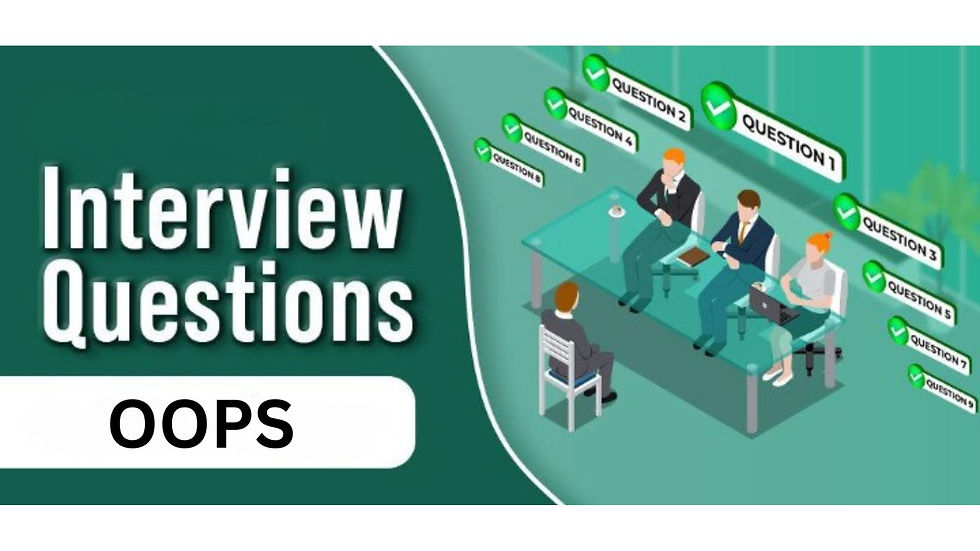What are the best strategies to get ready for the technical CSS interview question?
- Divyansh WsCube
- Oct 23, 2023
- 3 min read

Introduction
Preparing for a technical CSS interview can be a daunting task, but with the right strategies and preparation, you can boost your confidence and increase your chances of success. In this blog, we'll explore the best strategies to help you get ready for technical CSS interview questions, ensuring you can demonstrate your expertise and excel in the interview.
1. Understand the Fundamentals:
Before diving into advanced CSS topics, it's essential to have a solid grasp of the fundamentals. Review the basics, including CSS syntax, selectors, properties, values, and the CSS box model. A strong foundation will make it easier to tackle more complex questions.
2. Hands-on Practice:
Practical experience is invaluable when preparing for a CSS interview. Work on personal projects or coding exercises that require CSS. Try building various layouts, styling elements, and solving common design challenges. The more you practice, the more confident you'll become.
3. Explore Advanced Topics:
Your interview may include questions on advanced CSS topics, such as responsive design, Flexbox, CSS Grid, and animations. Devote time to thoroughly understand these concepts. Create responsive layouts, explore advanced layout techniques, and practice creating smooth animations.
4. Review Browser Compatibility:
Ensure you're aware of cross-browser compatibility issues and know how to handle them. Familiarize yourself with vendor prefixes for older browser support and explore modern CSS techniques to mitigate these issues.
5. Study Selectors and Specificity:
Be comfortable with CSS selectors, including pseudo-classes and pseudo-elements. Understand specificity and how it influences which styles are applied to elements. Practice using selectors to target specific elements effectively.
6. Learn CSS Preprocessors:
CSS preprocessors like SASS and LESS can streamline your CSS development process. Familiarize yourself with these tools, including variables, nesting, mixins, and functions. Be prepared to discuss their benefits in terms of code maintainability.
7. Master CSS Layout Systems:
Understand and be proficient in CSS layout systems, including Flexbox and CSS Grid. Know when to use each layout method and how to create complex and responsive designs using them.
8. Responsive Design:
Responsive design is a critical aspect of web development. Learn about media queries, viewport units, and fluid layouts. Practice designing web pages that adapt to different screen sizes and devices.
9. Explore CSS Frameworks:
Familiarize yourself with popular CSS frameworks like Bootstrap, Foundation, and Tailwind CSS. Understand their features and advantages in speeding up web development.
10. Optimize Performance:
Learn about performance optimization techniques, such as minimizing HTTP requests, optimizing images, and using efficient CSS. Understand the critical rendering path and how it affects web performance.
11. Debugging and Troubleshooting:
Master the art of debugging CSS. Learn to use browser developer tools effectively to identify and resolve issues. Be ready to discuss common problems, like layout issues, specificity conflicts, and browser rendering quirks.
12. Practice with Real-world Projects:
Apply your CSS skills to real-world projects. Create a portfolio that showcases your experience in building web applications and solving common design and layout challenges.
13. Stay Updated:
Web development is an ever-evolving field. Stay up-to-date with the latest CSS standards, best practices, and browser updates. Following industry blogs, tutorials, and attending web development conferences can help you stay current.
14. Soft Skills and Communication:
While technical knowledge is crucial, don't forget about soft skills. Practice explaining your thought process, problem-solving skills, and teamwork experiences. Communication is vital during the interview.
15. Mock Interviews:
Consider conducting mock interviews with a friend, mentor, or a professional interview coach. Mock interviews can help you get used to answering questions under pressure and provide valuable feedback.
Conclusion
In conclusion, preparing for a technical CSS interview requires dedication and a holistic approach. The key is not just memorizing answers but understanding the underlying concepts and being able to apply your knowledge to real-world scenarios. By following these strategies, you can confidently tackle interview questions on CSS and demonstrate your expertise to potential employers. Good luck with your CSS interview preparation!



Comments